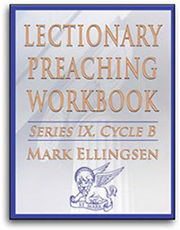SermonStudio
Proper 17 / Pentecost 14 / Ordinary Time 22
Preaching
Lectionary Preaching Workbook
Series IX, Cycle B
Theme of the Day
A love that changes lives.
Collect of the Day
After confessing that God is our strength while we are weak, petitions are offered that we be protected from all dangers and be cleansed from all evil arising from within ourselves. Justification (by Grace) and providence are emphasized.
Psalm of the Day
Psalm 45:1-2, 6-9
* A Korah Psalm; a love song or ode for a royal wedding. Martin Luther regards it as a love song between Christ and the church (Luther's Works, Vol. 10, pp. 208-210).
A love that changes lives.
Collect of the Day
After confessing that God is our strength while we are weak, petitions are offered that we be protected from all dangers and be cleansed from all evil arising from within ourselves. Justification (by Grace) and providence are emphasized.
Psalm of the Day
Psalm 45:1-2, 6-9
* A Korah Psalm; a love song or ode for a royal wedding. Martin Luther regards it as a love song between Christ and the church (Luther's Works, Vol. 10, pp. 208-210).


